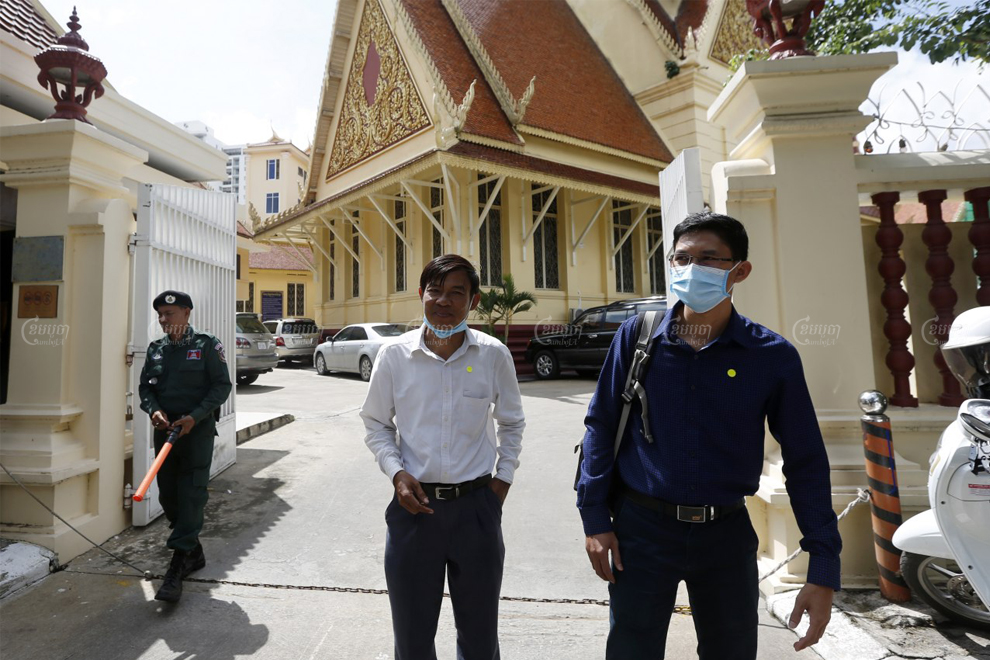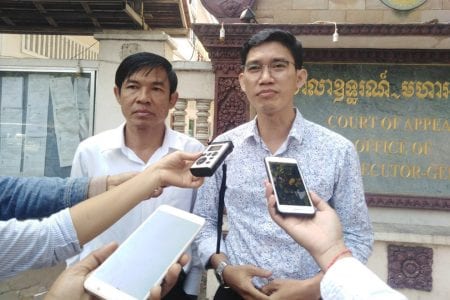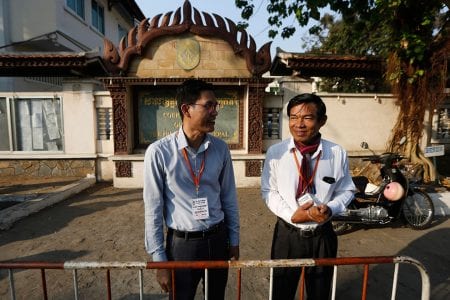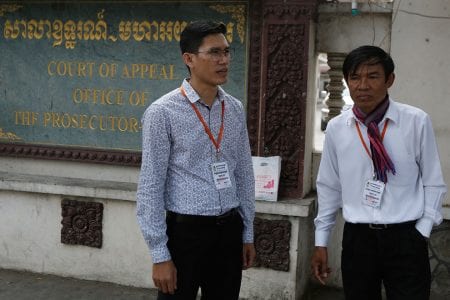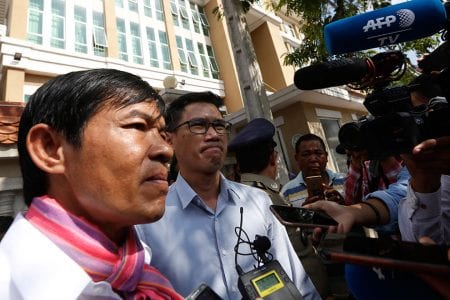Two former Radio Free Asia journalists said during an appeal hearing at the Supreme Court on October 22 that they believe the court is violating their basic rights, saying that the court must clearly define the legal timeframe for its reinvestigation of their case.
During the trial, there was a heated debate over whether the ongoing reinvestigation of the case was infringing on the journalists’ fundamental freedoms, with the presiding judge insisting that reviewing a case was a common occurrence that did not affect the rights of the defendants.
The case against Yeang Sothearin and Uon Chhin has been in progress since they were arrested in November 2017 and detained for nine months. Their trial was held last year, but instead of issuing a verdict as planned in October 2019, the Phnom Penh Municipal Court announced the case would be reinvestigated.
The former RFA reporters are charged with supplying a foreign state with information prejudicial to national defense, apparently for continuing to supply articles to US-run Radio Free Asia after its Phnom Penh offices had closed.
The court said its reinvestigation would focus on gathering more evidence in three areas: the reporters’ research equipment, data from Chhin’s hard drive, and articles that Sothearin had sent to RFA’s Washington, DC, bureau.
In the courtroom on October 22, Sothearin called on the Supreme Court to overrule the lower courts’ decision to reinvestigate, saying there was no evidence of espionage.
He said that the articles he had sent to RFA after the news agency had shut its office in Phnom Penh in September 2017 had not harmed the nation.
“The information that I sent to [RFA] did not damage the country and until now, you can’t see any damage from the information I sent,” he said.
He went on to say that the articles he sent to the Washington bureau of RFA were about Sam Rainsy’s criticism of the government for arresting Kem Sokha, and the Information Ministry’s press conference on the shuttering of RFA’s bureau in Phnom Penh.
“It is affecting our rights, especially that judges have failed to consider the interests of the defendants,” Sothearin said.
“The reinvestigation without defining a timeframe is affecting our freedom of movement, and the court should consider the rights of its citizens,” he added.
Presiding Judge Nil Non then interrupted Sothearin to say that judges do not listen only to the concerns of the defendant, but to all parties.
“[Judges] must take a lot into consideration,” he said.
“We do not work in place of the judges at the Phnom Penh Municipal Court, and we frankly praise that they [judges] decided to reinvestigate if there was doubt, in order to thoroughly review the case, and whether their work will be fast or slow depends on the individual and how many cases are at court,” he said.
Non said the Supreme Court also conducts reinvestigations to find the truth.
“We would like to verify that here [Supreme Court] we often have decided to reinvestigate and return a case to the Court of Appeal or review it ourselves to find evidence,” he said.
“Don’t be confused that a reinvestigation is a violation of the rights [of the defendants],” Non said. “It is the procedure of the court to find the truth.
He said the defendants should encourage the investigating judge to speed up the reinvestigation rather than trying to convince the Supreme Court that the process was unfair.
Sam Chamroeun, the defense lawyer for the pair, said during the hearing that usually, the reinvestigation procedure needed to follow a timeframe, and that prolonging it affected the interests of the defendants.
“The decision should take into consideration the rights and freedom of defendants,” he said.
“I think that it is not necessary to hold a reinvestigation,” Chamroeun said, adding that the procedure was being completely conducted at the pace of the investigating judge.
He asked the Supreme Court to reject the verdict of the Court of Appeal and to drop all charges against his clients, to which Judge Non replied: “That is your opinion and the lawmaker doesn’t think like you.”
“Here, we are not allowed to engage in political law,” he added.
Ouk Kimsith, deputy prosecutor general at the Supreme Court, asked the judges to reject the appeal by the two defendants and uphold the decision by the Court of Appeal.
Speaking to reporters after the hearing, Sothearin said the court should be more understanding.
“The court has to understand the difficulties faced by citizens, and if there is no definition of a timely reinvestigation, how can we live?” he asked.
“The most important issue is that we are losing our freedoms,” he said.
Chin called on the court to speed up its investigation procedure and set up a retrial of his case, if necessary, in order to end it.
“Right now, we are living with no inner peace,” he said.
Both journalists claimed that their arrests and the decision to reinvestigate their case were politically motivated.
Am Sam Ath, deputy director at rights group Licadho, who attended the hearing, agreed that the reinvestigation had affected the fundamental rights of both defendants, noting that it had already taken roughly two years.
“Firstly, they don’t have full freedoms of movement, and Sothearin said that he can’t even visit his parents at Kampuchea Krom,” he said.
He said that the reinvestigation was a clear indication that there is not enough evidence to find the defendants guilty.
Sam Ath said that civil society groups believe the arrests of Sothearin and Chhin are ‘politically motivated rather than an attempt to implement the law.”
A verdict is due to be announced on October 27.


